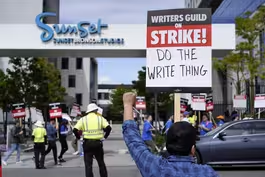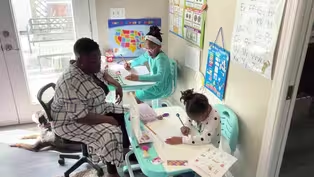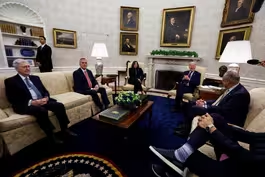
Death of migrant child highlights struggles at border
Clip: 5/18/2023 | 6m 49sVideo has Closed Captions
Death of migrant child in U.S. custody highlights struggles at southern border
For the second time this month, an underage migrant has died in U.S. custody. U.S. Customs and Border Protection said an 8-year-old girl at a Border Patrol facility in Texas “experienced a medical emergency.” Officials said the number of encounters with migrants crossing the U.S.-Mexico border has fallen by more than half since Title 42 ended. Geoff Bennett discussed the latest with Kica Matos.
Problems playing video? | Closed Captioning Feedback
Problems playing video? | Closed Captioning Feedback
Major corporate funding for the PBS News Hour is provided by BDO, BNSF, Consumer Cellular, American Cruise Lines, and Raymond James. Funding for the PBS NewsHour Weekend is provided by...

Death of migrant child highlights struggles at border
Clip: 5/18/2023 | 6m 49sVideo has Closed Captions
For the second time this month, an underage migrant has died in U.S. custody. U.S. Customs and Border Protection said an 8-year-old girl at a Border Patrol facility in Texas “experienced a medical emergency.” Officials said the number of encounters with migrants crossing the U.S.-Mexico border has fallen by more than half since Title 42 ended. Geoff Bennett discussed the latest with Kica Matos.
Problems playing video? | Closed Captioning Feedback
How to Watch PBS News Hour
PBS News Hour is available to stream on pbs.org and the free PBS App, available on iPhone, Apple TV, Android TV, Android smartphones, Amazon Fire TV, Amazon Fire Tablet, Roku, Samsung Smart TV, and Vizio.
Providing Support for PBS.org
Learn Moreabout PBS online sponsorshipGEOFF BENNETT: For the second time this month, an underage migrant has died in U.S. custody.
U.S. Customs and Border Protection said late yesterday that an 8-year-old girl at a Border Patrol facility in Texas experienced a medical emergency and later died.
CBP is investigating the incident.
The announcement came just days after the end of the pandemic era program known as Title 42.
Officials say the number of encounters with migrants crossing the U.S.-Mexico border has fallen by more than half since last week.
We're joined now by Kica Matos, president of the National Immigration Law Center.
Thank you for being with us.
KICA MATOS, President, National Immigration Law Center: Thank you for having me.
GEOFF BENNETT: And we should say the Associated Press reports that the little girl who died was from Panama and that she had heart problems.
She had surgery for those heart problems in Panama, and that she crossed with her father, mother and two older siblings.
And the facility where she and her family were being detained sits on one of the busiest corridors for migrant crossings.
Separate from this specific case, tell us about these facilities.
Can they adequately address the manifold issues that families and children president with?
KICA MATOS: Yes, first, my heart goes out to the family of that little girl.
I was on the border just last week witnessing the end of Title 42 and the impact of the asylum ban that the Biden administration has imposed.
What I will tell you about the Customs and Border Patrol facilities is that they all like black boxes.
Lawyers don't have access to them.
Advocates don't have access to them.
And we know that the conditions right now are extremely overcrowded.
The history of CBP facilities are stories of inhumane conditions that no human being should ever have to confront.
GEOFF BENNETT: Before Title 42 was lifted, U.S. officials said that they were preparing for as many as 11,000 people crossing the border a day.
At the end of Title 42, encounters dropped to less than 5,000 people.
What accounts for that?
KICA MATOS: I don't know the answer to that.
But I will tell you that I was on the border last week.
And what I saw were thousands of migrants following the regulations that were imposed by the United States government, patiently waiting for their appointments on the Mexican side of the border.
There was a lot of lack of information, misinformation, disinformation.
When we talk toed a lot of the migrants, what we heard was stories of people fleeing desperate conditions, grabbing their families and running for their lives to the border, so that they could present themselves lawfully to seek asylum in the United States.
GEOFF BENNETT: There are people who say that the ability for migrants to show up on U.S. soil and apply for asylum, that that process is sacrosanct, and that the administration, both with their deterrence policies and now establishing alternate routes for people to claim asylum in country, that that runs afoul of U.S. values, of American values.
How do you see it?
KICA MATOS: It not only runs afoul of U.S. values and what we stand for as a nation; it is also in violation of our own domestic laws and our own obligations under international law.
So, under the U.S. law, anybody who seeks asylum has a right to come to the U.S. and present themselves, whether they do it at an airport, whether they do it at a port of entry, whether they cross the border and do it.
We have an obligation under U.S. laws and our own allegiance to international laws to do that.
This asylum ban -- and I'm using those words intentionally -- makes it impossible for people to access political asylum in the United States.
GEOFF BENNETT: But it appears those policies are working.
Is there another way that you can achieve both goals?
KICA MATOS: We have an obligation to allow people to present themselves to seek asylum.
That does not mean that everybody who seeks asylum to the United States should be granted asylum.
We have an obligation to follow our own domestic laws.
I should also note that we have a deeply broken immigration system.
The last time we saw comprehensive immigration legislation take place in this country was in 1986, under Donald -- under Ronald Reagan.
What that means is that we have for decades dealt with a deeply broken immigration system that has very few avenues for people to legally come into the United States.
We hear a lot from people saying, well, why can't they do it legally?
The truth of the matter is that our system is broken and Congress refuses to act.
GEOFF BENNETT: For a long time, border crossers were mostly single men, and that has shifted over time to include families and unaccompanied children.
Have our policies, have the resources have the infrastructure along the Southern border adequately shifted to account for that change?
KICA MATOS: No.
Look, I spent four days last week in the border.
And we met with people who are on the Mexican side of the border, waiting patiently to be given appointment.
We visited encampments.
We visited shelters.
We met with families.
We met with families with young children.
These encampments -- the conditions in these encampments are deplorable.
They are inhumane.
There is no basic infrastructure.
In one encampment that we went to, there were two port-a-potties for approximately 1,200 people.
A lot of the people who are in these encampments rely on humanitarian assistance from nonprofit organizations that are cobbling resources together to try to meet very basic needs.
We have an obligation.
We have the resources.
We have the ability to provide infrastructure so that these families, while they wait to be processed, have the very basic standards that human decency requires.
And we're not providing that as a government.
GEOFF BENNETT: Kica Matos is the president of the National Immigration Law Center.
Thanks for being with us.
KICA MATOS: Thank you for having me.
Actors' union threatens to strike alongside writers
Video has Closed Captions
Clip: 5/18/2023 | 7m 56s | Hollywood faces larger work stoppage as actors threaten to strike alongside writers (7m 56s)
China scrutinized for police intimidating dissidents abroad
Video has Closed Captions
Clip: 5/18/2023 | 8m 30s | China scrutinized for secret police watching and intimidating Chinese dissidents abroad (8m 30s)
How homeschooling has impacted traditional school enrollment
Video has Closed Captions
Clip: 5/18/2023 | 8m 26s | How homeschooling's rise during the pandemic has impacted traditional school enrollment (8m 26s)
What could happen if Congress fails to raise debt ceiling
Video has Closed Captions
Clip: 5/18/2023 | 6m 15s | Economic experts on what could happen if Congress fails to raise debt ceiling (6m 15s)
What Montana's TikTok ban means for the app and its users
Video has Closed Captions
Clip: 5/18/2023 | 8m 27s | What Montana's TikTok ban means for the popular social media app and its users (8m 27s)
Providing Support for PBS.org
Learn Moreabout PBS online sponsorship
- News and Public Affairs

FRONTLINE is investigative journalism that questions, explains and changes our world.

- News and Public Affairs

Amanpour and Company features conversations with leaders and decision makers.












Support for PBS provided by:
Major corporate funding for the PBS News Hour is provided by BDO, BNSF, Consumer Cellular, American Cruise Lines, and Raymond James. Funding for the PBS NewsHour Weekend is provided by...




